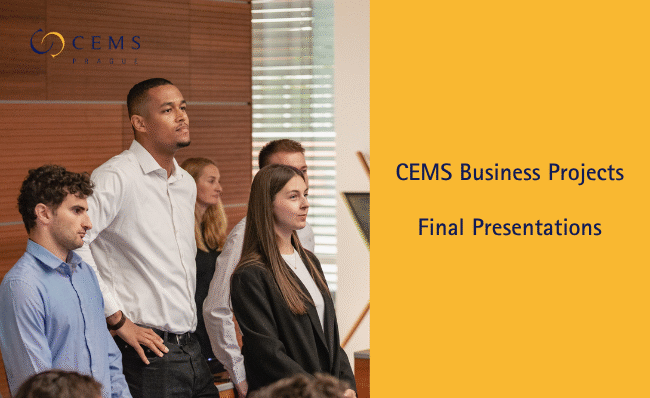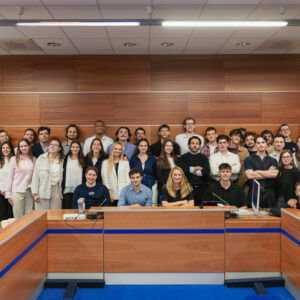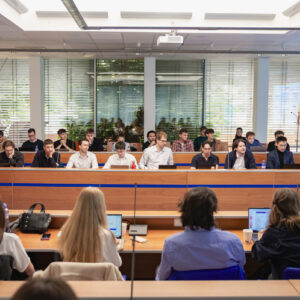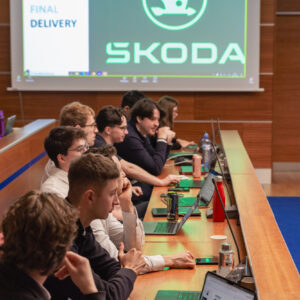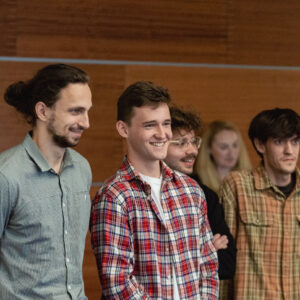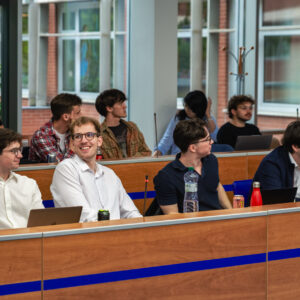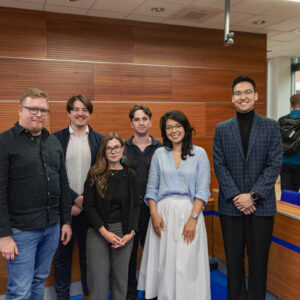Robots, apps, startups, beer and power tools: Check out what students did in their CEMS Business Projects!
The end of May marks one of the highlights of the CEMS/MIM studies at Prague University of Economics and Business: before heading to the CEMS Club Prague semester closing party, students take part in the finale of the CEMS Business Projects, which they have been working on throughout the entire semester alongside their mentors. The day of final presentations has arrived, and the teams presented their findings and recommendations to clients — CEMS corporate partners who help shape the next generation of business leaders by challenging students with real-world strategic problems.
CEMS Business Projects 2025 were:
Asahi Europe & International (AEI): Benchmarking & Optimization of Commercial Capital Investments
Hilti: Customer Loyalty in the Construction Sector – How to Steer Pricing in Order to Strengthen Customer Trust and Build Partnership
Hilti: Improving OPEX Management through an Optimized Purchase Cycle (cross-border project with other CEMS schools – Corvinus University Budapest and Warsaw School of Economics)
L’Oréal: E-commerce Acceleration of Beauty Business
Plzeňský Prazdroj: Attracting Young Czech Beer Consumers
Škoda Auto: Using AI Robots to Streamline Dealer Processes
Škoda Auto: Analysis of Current Trends and Students’ Attitudes in the Automotive / Automotive Retail Areas
Unibail-Rodamco-Westfield: Westfield Rise Expansion Initiative
Rockaway Capital: European Venture Capital Strategy
Asahi Europe & International (AEI): Benchmarking & Optimization of Commercial Capital Investments
“Students were asked to optimize Asahi commercial investments and suggest growth opportunities across different markets AEI operates in. Their task was to analyse historical investment data and create internal benchmarks to identify areas for improvement. They conducted data-driven research using KPIs and financial ratios to propose optimized CAPEX strategies. The project aimed to enhance decision-making and set realistic financial targets for future investments.”
“Students have demonstrated strong skills analysing the data from different angles. Insights from students have provided fresh out of the box thinking and a great starting point for AEI to unify data capturing processes across markets to drive consistency before any decisions are made,” said Alina Abdulova, Regional Capex Manager at Asahi.
Hilti: Customer Loyalty in the Construction Sector – How to Steer Pricing in Order to Strengthen Customer Trust and Build Partnership
Students explored how pricing strategies can influence customer loyalty in the competitive construction industry. Their task was to analyze Hilti’s product portfolio, focusing on frequently purchased items, and assess how these products impact customer engagement. They compared Hilti’s pricing and value positioning with competitors, and developed tailored pricing recommendations for different sales channels such as direct sales and e-commerce. The final goal was to propose actionable pricing initiatives that would strengthen customer trust and long-term partnerships.
“I was impressed how the entire team deep dive into the topic. Many suggestions, which the team presented, are topics to be discussed and ideally implemented with our marketing team. We are always thankful for different perspectives, fresh ideas and out of the box thinking. Therefore, we evaluate it as a successful result and we are looking forward to the next team.” said Head of Marketing for local region Miloš Hrábek.
Hilti: Improving OPEX Management through an Optimized Purchase Cycle (cross-border project with other CEMS schools – Corvinus University Budapest and Warsaw School of Economics)
This international project focused on improving how Hilti manages indirect spending across its Eastern European markets. Students analyzed the current purchasing processes in each country, identified inefficiencies, and benchmarked best practices from other regions and companies. Their goal was to propose a standardized and more efficient purchasing process that would improve compliance, transparency, and cost control. The project required collaboration across countries and gave students experience in procurement strategy, process optimization, and cross-border teamwork.
“The students have demonstrated their proficiency in team collaboration within a multinational environment, effectively capturing the core information and presenting it in a structured manner. The recommendation to integrate an automated tool into the P2P process has been well-received and shows potential for practical implementation. Well done team!” congratulated Jana Petříková, Procurement Manager for Czechia and Slovakia at Hilti.
L’Oréal: E-commerce Acceleration of Beauty Business
L’Oréal challenged students to find ways to grow its e-commerce business by focusing on mobile app solutions. Students analyzed sales data to understand how often customers use apps to buy products and what features drive conversions. They also researched how top e-commerce players in Europe use their apps and how brands are activated on these platforms. Based on this, they proposed concrete steps to increase app-driven sales for L’Oréal’s beauty brands. The project combined data analysis, digital marketing, and creative thinking in a fast-evolving online retail environment.
“Working on the CEMS Business project was a great experience. I appreciate the analytical skills and business mindset of the team. The outcome of the project is valuable for our company, mainly the market research part where students gave us insights on different apps in the biggest Europe ecom players. Looking forward to trying some of the project outcomes in real life,” said Mária Sochorová Regional Account Lead for Europe Zone at L’Oréal.
Plzeňský Prazdroj: Attracting Young Czech Beer Consumers
Faced with declining beer consumption and an aging customer base, Plzeňský Prazdroj asked students to help attract younger consumers. The team conducted a demographic study to understand the habits and preferences of the younger generation and proposed a strategy to align the company’s product portfolio with their expectations. The project aimed to ensure long-term growth by making beer more appealing to a new audience. Students used their experience and knowledge in market research, consumer behavior analysis, and strategic brand positioning.
“The students delivered impressive work, combining solid research with creative thinking to tackle a real business challenge. Their insights into young consumers’ preferences and recommendations were both relevant and actionable. This cooperation brought fresh perspectives that enriched our marketing approach. We’re grateful for their professionalism and enthusiasm as Plzeňský Prazdroj is always looking for new, enthusiastic collaborations and welcomes young talent eager to shape the future with us,” said Radek Záhorovský who is Senior Finance Business Partner for Czechia, Germany and Austria at Plzeňský Prazdroj.
Škoda Auto: Using AI robots to Streamline Dealer Processes
Škoda Auto asked students to explore how AI-powered robots could improve efficiency in car dealerships. Students proposed specific use cases such as automated vehicle check-in, robotic assistance in repairs and warehouses, virtual customer assistants, and AI-driven diagnostics. They also explored how robots could support employee training and sales processes. The goal was to identify practical applications of robotics that would save time, reduce errors, and enhance customer experience. The project combined innovation, technology, and real-world business operations.
Světlana Hálková from Škoda Auto’s Sales and After Sales Training Academy said: “Your work was very professional, and I really like the results. I believe it could be very beneficial for some of our dealerships. I will forward it to the management so they can consider implementing at least some of your proposals.”
Her colleague Martin Brodík hastened to say: “The students were exceptionally proactive and demonstrated remarkable enthusiasm throughout the entire project. They brought forth numerous innovative and exciting solutions with real potential for practical implementation within our dealerships. Their work has genuinely inspired us, and personally, I see great value in implementing several of their proposals, especially within the Czech market.”
Škoda Auto: Analysis of Current Trends in Automotive Retail Areas
This project aimed to understand how companies can better prepare current generations for careers in automotive retail. Students investigated current trends in learning and development and surveyed part-time students about their motivations and expectations. Based on their findings, they proposed enhancements to learning and development programs for dealership staff. The project assisted Škoda in aligning its educational efforts with the needs of future employees and provided students with valuable experience in research and data analysis. The outcomes of the project supported the Training Academy by integrating current trends and expectations, and identified five crucial pillars for future development.
“All participating students were actively involved in the process, demonstrating strong motivation and engagement with various tasks and questions related to the trends. Their attitude, drive, and interest in finding and optimizing potential solutions were positively evaluated,” said Vasilii Ostin from Sales and After Sales Training Academy at Škoda Auto.
Unibail-Rodamco-Westfield: Westfield Rise Expansion Initiative
Students were asked to assess the market opportunity for expanding Westfield Rise, an in-house retail media agency, outside of the existing network in the Czech Republic. The final output included identification of potential shopping centers, market size assessment, financial analysis preparations, and a set of recommendations for expansion. The project aimed to develop a strategic growth plan for Westfield Rise.
„Students demonstrated curiosity and eagerness to learn about the retail media industry. They went the extra mile in many cases, showing a strong commitment to the project. Their thorough market analysis and innovative recommendations will drive the next steps on Westfield Rise,“ said its Junior Manager Media, Brand Experience and Partnerships Julie Janáková.
Rockaway Capital: European Venture Capital Strategy
The goal of this project was to simulate the creation and operation of a European venture capital fund. Students had to develop a clear and well-reasoned investment thesis — defining which types of startups, sectors, and regions the fund should focus on and why. They also had to design a practical strategy for sourcing promising startups across Europe, using tools like networking, data analysis, and ecosystem engagement. Finally, they created a structured evaluation framework to assess and prioritize investment opportunities, from initial screening to final decision-making.
“We were really impressed by the drive and autonomy of the students. They’ve done a great job and the results were applicable in our real work. We are already in discussion with the top startups identified by the team of the students,“ concluded Investment Associate at Rockaway Capital Max Palko.
